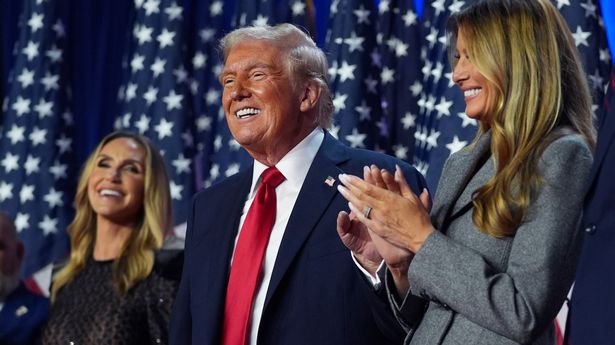Millions of UK households are expected to pay the price of Donald Trump’s victory in the United States Presidential election.
Experts warn UK economic growth could be slashed if Mr Trump enacts a raft of threatened policies, including tariffs on imports. Think tank the National Institute of Economic and Social Research (NIESR) also warned such measures could fuel inflation and even drive interest rates back up.
It comes amid fears that Mr Trump's win will unleash a fresh wave of global inflation, just as it was beginning to come under control. He campaigned on a promise to impose tariffs of between 10% and 20% on foreign imports as much as 60% on Chinese goods. Analysts warned that would be "bad news for Europe", and the UK.
Ahmet Kaya, a NIESR economist, said: “The UK is a small, open economy and would be one of the countries most affected.” NIESR warned the impact of tariffs on UK goods, plus higher prices due to a weaker pound against the US dollar, could slash UK economic growth next year from its previously predicted 1.2% to just 0.4%, and in 2026 from 1.4% to barely any growth. Those forecasts are based on Mr Trump imposing 10% tariffs on all goods and services to the US, with the possibility that there may be lower rates for certain products, which would lessen the impact.
Should the new President go ahead with the full threat, NIESR says it could also drive up UK inflation - and with it interest rates. NIESR had been forecasting UK inflation would average 1.8% next year but now says it could jump to 5.2%.
The Bank of England is expected to cut interest rates from 5% to 4.75% on Thursday, but future reductions were already being questioned by economists after last week's Budget. NIESR forecast the Bank of England's base rate would average 4.1% next year, but now says it could leap to 6.8% were President Trump to go ahead with tariffs that send inflation much higher in the UK, and average 5.1% in 2026. Any such rise in rates would be a huge blow to millions of mortgage borrowers and others with loans who have already been left reeling from high sky bills. Many have been hoping that cost of home loans was coming down.
Follow our US election live blog for the latest updates on the race to the White House
Chris Beauchamp, chief market analyst at online trading platform IG, warned Trump’s policies could delay future interest rate cuts by the Federal Reserve, America’s central bank, with a knock-on impact here. “If the Fed doesn’t cut rates, you would expect a further rise in the dollar,” he explained.
“That pushes down the pound, which drives up the cost of imported goods to the UK.” Mr Beauchamp warned this threat of so-called imported inflation would be a “nightmare” for the Bank of England, as it could increase inflation, just as it looks like being under control. That, in turn, could mean the Bank easing back on interest rate cuts next year, hitting borrowers.
It came as Trump’s expected triumph in the US presidential election sent shockwaves through financial markets.
The dollar surged against a basket of other currencies, including the pound, on expectations that Trump policies could lead to higher inflation in America. The US dollar jumped at its fastest rate for two years, up 1.3% against the pound, at $1.287, its highest for two months.
In the UK, the FTSE 100 soared 125 points to 8297 in early trading, with the strong dollar expected to boost earnings of UK-listed multinationals on the index that make the bulk of their money abroad. However, it later lost ground and closed the day down.
US government borrowing costs also rose, with the yield - the effective interest rate - on 10-year bonds increasing to a four-month high of 4.47%. The equivalent for the UK - which jumped in the aftermath of last week’s Budget - remained at around 4.5%.
Bitcoin climbed as much as 8.54% to reach a record $75,060, given Mr Trump is seen as more actively supportive of cryptocurrencies than Kamala Harris. Susannah Streeter, head of money and markets at Hargreaves Lansdown, said: “Investors are bracing for tariffs and a clamp down on immigration, policies considered to be inflationary which are likely to mean interest rates may be more elevated in the years to come.
“Trump’s more renegade approach to trade is likely to push the US further away from global institutions and the rules-based order built up over many decades. But at the same time, expectations are high that a Trump presidency will mean fewer regulations on big tech and big finance.”
Russ Mould, investment director at City firm AJ Bell, said: “The policies espoused by Donald Trump during the campaign are generally seen as inflationary."
